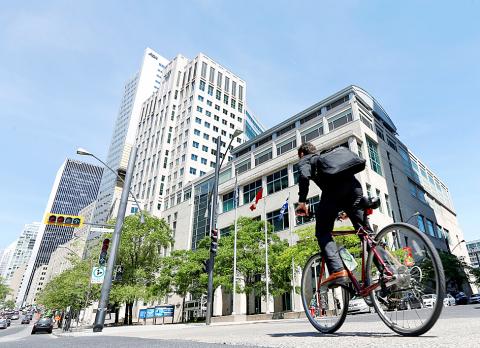The US House of Representatives’ Committee on Foreign Affairs on Monday denounced the International Civil Aviation Organization (ICAO) for blocking Twitter accounts that criticized the organization’s continued exclusion of Taiwan during a global public health crisis.
“The United Nation’s @icao plays a valuable role in ensuring aviation security. But silencing voices that oppose ICAO’s exclusion of Taiwan goes against their stated principles of fairness, inclusion, and transparency,” the committee said in a Twitter post.
The tweet was a response to ICAO blocking critics, US news Web site Axios said in a report earlier on the same day.

Photo: Reuters
According to Axios, Jessica Drun (莊宛樺), a non-resident fellow at the Project 2049 Institute, on Sunday noticed that ICAO had blocked her on Twitter, two days after she criticized the organization and the WHO for refusing to share knowledge with Taiwan’s authorities in a tweet.
“This means civil aviation authorities for one of busiest regional airports do not receive up-to-date info on any potential ICAO-WHO efforts. This is how a virus spreads,” Drun tweeted on Thursday last week.
There has been an outbreak of the 2019 novel coronavirus (2019-nCoV), which causes respiratory infection, in the city of Wuhan, China, where the virus was first detected last month.
The virus has since spread to other countries, reaching Europe and the US as a result of people traveling by air, sea and land, or direct contact with a carrier.
The airport Drun mentioned in her tweet was Taiwan Taoyuan International Airport, which was ranked the 11th busiest airport in the world in terms of international passenger traffic in 2018, handling more than 46.5 million passengers.
The Twitter accounts of several other critics were also blocked by ICAO, the Axios report said. However, it did not identify them, saying only that some were Capitol Hill staffers, analysts and an English teacher in Guangzhou who had posted similar criticisms.
Through his press shop Twitter account, US Senator Marco Rubio described ICAO’s action as “outrageous” and said it was “another sign that the Chinese Communist Party’s efforts to pressure and bully international organizations to bend to its demands are working.”
In another tweet posted on Friday last week, Rubio said that Beijing’s efforts to block Taiwan’s meaningful participation in international organizations such as the WHO have real effects on global responses to public health crises.
“We are especially reminded of this as the deadly coronavirus has reached Taiwan,” he tweeted.
ICAO Secretary-General Fang Liu (劉芳), a former Chinese aviation official, issued a reminder of the organization’s social media rules on Twitter, saying: “Irrelevant, compromising and offensive material will be removed and the publisher precluded.”
“Join us in improving advocacy for sustainable aviation development through fact-based discourse,” she tweeted.

NATIONAL SECURITY THREAT: An official said that Guan Guan’s comments had gone beyond the threshold of free speech, as she advocated for the destruction of the ROC China-born media influencer Guan Guan’s (關關) residency permit has been revoked for repeatedly posting pro-China content that threatens national security, the National Immigration Agency said yesterday. Guan Guan has said many controversial things in her videos posted to Douyin (抖音), including “the red flag will soon be painted all over Taiwan” and “Taiwan is an inseparable part of China,” while expressing hope for expedited “reunification.” The agency received multiple reports alleging that Guan Guan had advocated for armed reunification last year. After investigating, the agency last month issued a notice requiring her to appear and account for her actions. Guan Guan appeared as required,

A Vietnamese migrant worker yesterday won NT$12 million (US$379,627) on a Lunar New Year scratch card in Kaohsiung as part of Taiwan Lottery Co’s (台灣彩券) “NT$12 Million Grand Fortune” (1200萬大吉利) game. The man was the first top-prize winner of the new game launched on Jan. 6 to mark the Lunar New Year. Three Vietnamese migrant workers visited a Taiwan Lottery shop on Xinyue Street in Kaohsiung’s Gangshan District (崗山), a store representative said. The player bought multiple tickets and, after winning nothing, held the final lottery ticket in one hand and rubbed the store’s statue of the Maitreya Buddha’s belly with the other,

‘NATO-PLUS’: ‘Our strategic partners in the Indo-Pacific are facing increasing aggression by the Chinese Communist Party,’ US Representative Rob Wittman said The US House of Representatives on Monday released its version of the Consolidated Appropriations Act, which includes US$1.15 billion to support security cooperation with Taiwan. The omnibus act, covering US$1.2 trillion of spending, allocates US$1 billion for the Taiwan Security Cooperation Initiative, as well as US$150 million for the replacement of defense articles and reimbursement of defense services provided to Taiwan. The fund allocations were based on the US National Defense Authorization Act for fiscal 2026 that was passed by the US Congress last month and authorized up to US$1 billion to the US Defense Security Cooperation Agency in support of the

CLASSIFIED BRIEFING: The ministry said the special budget focuses on building a comprehensive defense system and strengthening the domestic defense industry The Ministry of National Defense yesterday released information on seven categories of weapons systems to be procured under a stalled NT$1.25 trillion (US$39.57 billion) special defense budget, including precision artillery, long-range missiles, air defense anti-tank missiles and more than 200,000 uncrewed aerial vehicles (UAVs). The Executive Yuan approved a draft version of the budget on Nov. 27 last year and submitted it to the legislature for review. The legislature’s Foreign Affairs and National Defense Committee yesterday invited Minister of National Defense Wellington Koo (顧立雄) to deliver a classified briefing and answer questions at a closed-door session. Koo said he hoped to provide lawmakers